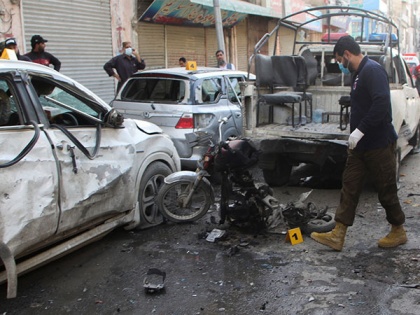Violence against minorities in Pakistan on rise, reports Human Rights Commission of Pakistan
By ANI | Published: April 28, 2023 05:37 AM2023-04-28T05:37:56+5:302023-04-28T05:40:05+5:30
Islamabad [Pakistan], April 28 : In its flagship annual report State of Human Rights in 2022, released earlier this ...

Violence against minorities in Pakistan on rise, reports Human Rights Commission of Pakistan
Islamabad [Pakistan], April 28 : In its flagship annual report State of Human Rights in 2022, released earlier this week, the Human Rights Commission of Pakistan (HRCP) expressed concern over the political and economic turmoil of last year, both of which have had a serious impact on the human rights situation.
Both the incumbent and previous governments failed to respect the supremacy of Parliament, while tussles among the legislature, executive and judiciary undermined institutional credibility, the report noted.
The report stated further that political victimisation continued throughout the year, with colonial-era sedition laws being weaponised to stifle dissent. Dozens of journalists and opposition politicians were arrested, with ensuing claims of custodial tortureironically in the same year that the Parliament passed a bill criminalising the use of torture, HRCP said in its report.
The agitation that followed the successful vote of no-confidence against former prime minister Imran Khan saw law enforcement personnel clash with protesters in various parts of the country, with the right to freedom of assembly being violated but also abused.
The year saw an alarming resurgence in terror attacks, the highest in five years, with 533 lives lost, the HRCP report said, adding that despite citizens' warnings that such developments were imminent, especially in Khyber Pakhtunkhwa, the state continued to fumble in addressing militancy.
HRCP also noted an uptick in enforced disappearances, particularly in Balochistan, with 2,210 reported cases remaining unresolved even as a bill criminalising the act was passed by the National Assembly.
The report also noted that as climate change-induced floods ravaged much of the country, relief and rehabilitation for over 33 million affected persons fell woefully short.
This lacklustre response has underscored the need for empowered, well-resourced local governments in every province and territory, the HRCP said in its report.
Escalating threats to freedom of religion or belief remained a grave concern, it said, adding that while the number of police reports on blasphemy charges fell, the incidence of mob lynching appears to have risen.
The Ahmadiyya community came under particular threat, with several places of worship and over 90 graves desecrated, primarily in Punjab, the HRCP report stated further, adding that the violence against women continued unabated, with at least 4,226 instances of rape and gang rape compounded by an abysmally low conviction rate for perpetrators.
Additionally, the scale of violence and discrimination against trans persons, the theme of this edition of the report, was compounded by the conservative backlash against the hard-won Transgender Persons (Protection of Rights) Act 2018.
In a year that began to see the country's economic situation unravel, the report notes that the rights of workers and peasants were sorely neglected. Although the minimum wage was increased, the state has yet to acknowledge that this falls below the threshold of a living wage, the report stated.
Additionally, while around 1,200 bonded labourers were freed in Sindh, the district vigilance committees constituted in 2022 remained largely dysfunctional, the HRCP noted, adding that the death toll in the country's mines also remained very high, at 90 workers.
HRCP demanded immediate action by the state on these issues if it is to move towards a pro-people approach to politics, law and governance.
Disclaimer: This post has been auto-published from an agency feed without any modifications to the text and has not been reviewed by an editor
Open in app